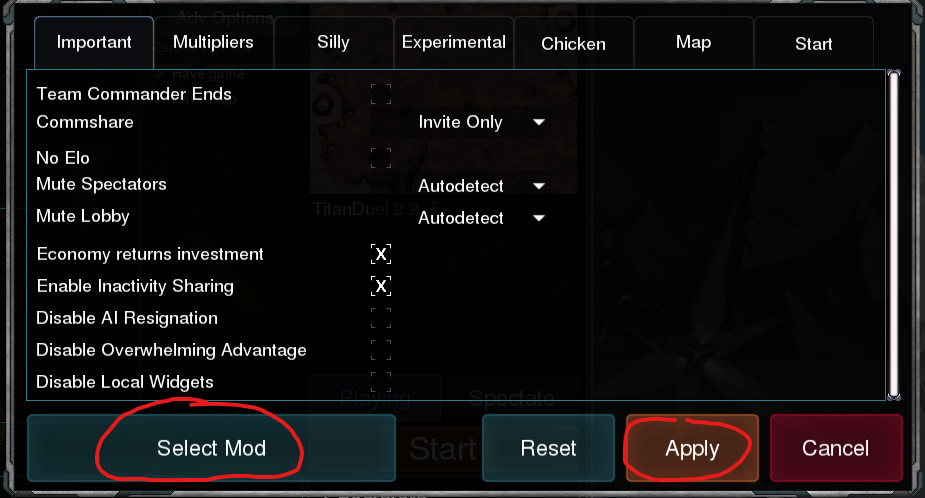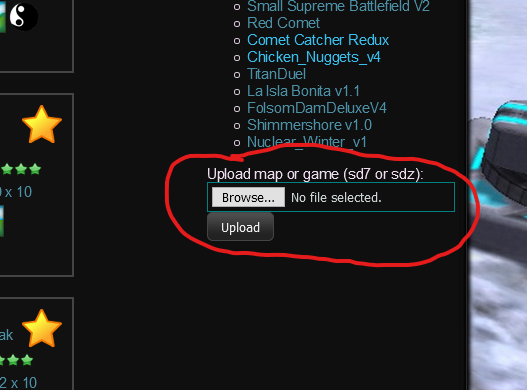Difference between revisions of "Mod Creation"
GoogleFrog (talk | contribs) |
GoogleFrog (talk | contribs) |
||
| Line 15: | Line 15: | ||
== More Significant Changes == | == More Significant Changes == | ||
Changing animations, unit behaviour, game mechanics or statistics is a little trickier than cosmetic changes. These types of changes affect everyone in a multiplayer game (as opposed to local interface changes) so require the creation and distribution of a game archive. Entirely new games for the Spring engine can be made with this method. | Changing animations, unit behaviour, game mechanics or statistics is a little trickier than cosmetic changes. These types of changes affect everyone in a multiplayer game (as opposed to local interface changes) so require the creation and distribution of a game archive. Entirely new games for the Spring engine can be made with this method. | ||
| + | |||
| + | This page tells you how to use Zero-K to easily set up a modding environment and how to run mods on the Zero-K server. For specific information on the components that make up a mod consult the [https://springrts.com/wiki/Gamedev:Main SpringRTS wiki]. | ||
=== Mutators === | === Mutators === | ||
Revision as of 22:57, 19 August 2020
Zero-K runs on the Spring engine, which supports a lot of modification of game files. The most advanced mods may amount to creating an entire new game. The Spring engine wiki is a valuable resource for game and mod development using the engine, especially the gamedev page.
Familiarity with the game repository or main menu repository is important for modding and downloading a searchable version is advised. See Developing#Getting_Sources for how to download a local version of the repository.
Contents
Cosmetic and UI changes
Some changes can be made just by adding files to your install directory. The following subfolders of the game repository should support this (feel free to attempt more): unitpics, sounds, unittextures, bitmaps, anims, icons and LuaUI. Replace a file by perfectly matching its name and path.
Here's an example config replacement for team colour config that you can place in LuaUI/Configs/LocalColors.lua.
Everything in the main menu repository can be overridden.
Widgets
For LuaUI changes you will need to enabled local widgets and load local widgets first through the advanced settings in Settings/Interface/Misc. Completely new widgets can also be added and loaded.
More Significant Changes
Changing animations, unit behaviour, game mechanics or statistics is a little trickier than cosmetic changes. These types of changes affect everyone in a multiplayer game (as opposed to local interface changes) so require the creation and distribution of a game archive. Entirely new games for the Spring engine can be made with this method.
This page tells you how to use Zero-K to easily set up a modding environment and how to run mods on the Zero-K server. For specific information on the components that make up a mod consult the SpringRTS wiki.
Mutators
A mutator is a mod archive that can add and override files relative to a base archive. Mods that make relatively small changes to Zero-K should be made with a mutator, as this keeps filesizes low and allows the mod to stay up to date with fixes or changes to other parts of Zero-K. Even large projects should probably start out as mutators, as it enables the project to build up to handling every aspect of creating a full game archive.
is to make a mutator, this is a game package that includes modified files but otherwise uses the files of the base game. Here is an example mutator BaseMod.sdd.zip to get you started. Unzip it in Zero-K/games, and yes, the folder should be named with the extension ".sdd". Your file stucture should look like this.
Any file found in the mutator and the base game will be overridden by the version found in the mutator. New files can be added too.
Downloading the Zero-K repository
Maintaining a local development copy of Zero-K is very useful as poking around the repository can reveal a lot about the required structure for mutators, the names of files to override, and provides a place to trace errors. Clone the game repository as seen on the Developing page. The fork step can be skipped for now if you are just intending to take a look. Be sure to keep your local copy up to date by regularly using git to pull changes. With a local repository you can eventually open pull requests and push content to be included in the base game (if you're keen).
Running your mod - Singleplayer
Open a skirmish via the singleplayer menu and click 'Adv Options'.
Click 'Select Mod' and select your mod from the list. The example above is called 'Zero-K Base Mutator v1'. Click Apply.
The text beneath the Adv Options button should change from 'Zero-K vX.Y.Z.W' to the name of your mod.
Click 'Start' to start. Note that friends invited via skirmish coop will not be able to join the game unless they have a copy of your mod.
Running your mod - Multiplayer
First check modinfo.lua to make sure that your mod's name, shortname and version are unlikely to clash with any other mod. Then turn your .sdd into a .sdz through some unknown process, possibly involving 7z. Here is an example of a packaged version of the base mod: file not found. Upload your archive to zero-k.info/Maps.
Host a Custom passworded multiplayer battle. Select your mod from the 'Select Mod' list under 'Adv Options' (just as you would for singleplayer). Other players that join the room will automatically download your mod. Click start to play. It is best if you play from your sdz version rather than your sdd version, as any changes between your local version and uploaded archive could cause desync. It is a good idea to give your development .sdd version a unique version name.



